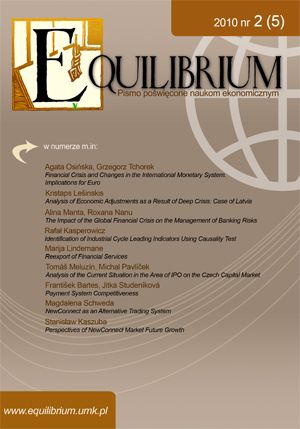Environmental Management in Germany
DOI:
https://doi.org/10.12775/EQUIL.2010.032Keywords:
environmental management, environmental management systems, ISO 14001, EMAS, GermanyAbstract
The article raises the problem of environmental management in Germany. Its main research field is focused on environmental management systems (EMS) certified according to ISO 14001 and on Ecology Management and Audit Scheme ? EMAS. The main target of this paper is to analyse how EMS operate in German economy and to evaluate the role of ecological initiatives among companies dealing with various aspects of global economic and environmental issues. The article underline German strong economic performance that leads to generating approximately 20% of EU?s GDP. That makes German economy one of the strongest among the EU Member States. The research shows that the environmental management plays an important role for German companies and organisations. The high rate of ISO 14001 implementations (4 877 in the end of 2007) gives Germany fourth rank in Europe and eight place globally. Whereas the evaluation of companies that took part in EMAS shows Germany as a leading country in this research field (1417 companies and organisations in 2009). The analysis carried through this research underlines the high importance of environmental management in German economy and among the companies. Moreover it shows the increasing significance of environmental CSR as a way of competing on global market, improving company?s image and fitting to global economic and environmental demand. Improving company?s environmental performance by implementation of environmental management conduct to cost reduction and rationalisation of its organisation. Therefore it is appropriate way of dealing with the global economic crisis and environmental questions.
Downloads
References
Beske P., Koplin J., Seuring S. (2008), The Use of Environmental and Social Standards by German First-Tier Suppliers of the Volkswagen AG, ?Corporate Social Responsibility and Environmental Management?, No 15, pp. 63-75.
Beteiligung an EMAS in Deutschland nach Branchen, EMAS. Service. PDF downloads, http://www.emas.de/service/pdf-downloads/ (30.08.2009).
Bil I. (2006), Gospodarka energetyczna a międzynarodowa konkurencyjność Niemiec, [in:] M. A. Weresa (red.), Międzynarodowa konkurencyjność Niemiec w rozszerzonej Unii Europejskiej. Szkoła Główna Handlowa w Warszawie, Warszawa.
Biokraftstoffe. Eine gute Ergänzung, Projektbericht. Erneuerbare Energien, Europäischen Kommission, Nr 1, April 2008.
Building a sustainable future. Sustainable Development Summary Report 2008 (2009), Allianz AG, Munich.
Corporate Social Responsibility Report 2007 (2007), Deutsche Bank AG, Frankfurt am Main.
Curkovic S., Sroufe R., Landeros R. (2008), Measuring TQEM Returns from the Application of Quality Frameworks, ?Business Strategy and the Environment?, No 17, pp. 93-106.
Darnall N., Jolley G. J., Handfield R. (2008), Environmental Management Systems and Green Supply Chain Management: Complements for Sustainability?, ?Business Strategy and the Environment?, No 18, pp. 30-45.
Driving Ideas. Sustainability Report 2009/2010 (2009), Volkswagen Aktiengesellschaft, Wolfsburg.
EMAS ? Das neue EG-Öko-Audit In der Praxis (2001), Anita Schütz (Projektleitung) IHK für München und Oberbayern, Bayerisches Staatsministerium für Landesentwicklung und Umweltfragen, Peschke Druck, München.
EMAS Statistics ? Evolution of Organisations and Sites, Quarterly Data 31.03.2009, http://www.emas.de/ueber-emas/emas-in-zahlen/ (30.08.2009).
Energieeffiziente Produkte. Verbrauch: Grün ist angesagt !, Projektbericht. Energieeffizienz, Europäischen Kommission, Nr 3, Juli 2008.
Europe in figures. Eurostat Yearbook 2008 (2008), Eurostat statistical books, Office for Official Publications of the European Communities, Luxembourg.
Gasiński T., Piskalski G. (2009), Zrównoważony biznes. Podręcznik dla małych i średnich firm na zlecenie Ministerstwa Gospodarki, Ministerstwo Gospodarki Det Norske Veritas (DNV), Fundacja Centrum CSR.
Glaztner L. (2001), ISO 14001 in Germany. A Survey of German Experience, Bundesumweltministerium (BMU, German Environment Ministry), Berlin.
Godula T. (2009), EMAS-2 czyli europejski system zarządzania środowiskowego, ?Problemy Jakości?, styczeń
2009.
Hamrol A. (2008), Zarządzanie jakością z przykładami. Wydanie drugie, zmienione, Wydawnictwo Naukowe
PWN, Warszawa.
How ISO standards support goals of World Environment Day 2009, http://www.iso.org/iso/pressrelease.htm?refid=Ref1230 (24.06.2009).
Jastrzębska E. M. (2007), Zarządzanie środowiskiem w przedsiębiorstwie, [in:] P. Jeżowski (red.), Ekonomiczne
problemy ochrony środowiska i rozwoju zrównoważonego w XXI wieku, Szkoła Główna Handlowa w Warszawie
? Oficyna Wydawnicza, Warszawa.
Kahlenborn W., Freier I. (2005), Umweltmanagementansätze in Deutschland, Bundesministerium für Umwelt, Naturschutz und Reaktorsicherheit (BMU), Referat Öffentlichkeitsarbeit, Berlin.
Key figures on Europe. 2009 Edition (2008), Eurostat pocketbooks, Office for Official Publications of the
European Communities, Luxembourg.
Paczuski R. (2008), Ochrona środowiska. Zarys wykładu, Oficyna Wydawnicza Branta, Bydgoszcz.
Peglau R., Baxter M. (2007), Special Report. The impact of ISO 14001. A decade of ISO 14001, ?ISO
Management Systems?, May-June 2007.
Pluskota P. (2007), Ekonomiczne aspekty ochrony środowiska, [in:] K. Małachowski (red.), Gospodarka a
środowisko i ekologia, Wydawnictwa Fachowe CeDeWu, Warszawa.
Poskrobko B. (2007), Rozwój systemów zarządzania środowiskowego, [in:] B. Poskrobko (red.), Zarządzanie
środowiskiem, Polskie Wydawnictwo Ekonomiczne, Warszawa.
Poskrobko B. (2007), Teoretyczne podstawy budowy systemu zarządzania środowiskiem, [in:] B. Poskrobko
(red.), Zarządzanie środowiskiem, Polskie Wydawnictwo Ekonomiczne, Warszawa.
10 Jahre EMAS. Nachhaltig und umweltbewusst wirtschaften in Deutschland (2005), Umweltgutachterausschuss
beim Bundesministerium für Umwelt, Naturschutz und Reaktorsicherheit, Redaktion: T. Kiel, M. Hansen, A.
Buschhüter, I. Müller-Schmoß, D. Tharan, Bundesministerium für Umwelt, Naturschutz und Reaktorsicherheit,
Berlin.
Rogala P. (2009), Kolejna generacja normy ISO 14001, ?Problemy Jakości?, luty 2009.
Schylander E., Martinuzzi A. (2007), ISO 14001 ? Experiences, Effects and Future Challenges: a National Study
In Austria, ?Business Strategy and the Environment?, No 16, pp. 133-147.
Sustainable Development Report 2008 (2009), Bayer AG Corporate Communications, Leverkusen.
Sustainability Report 2008. Corporate Social Responsibility at Henkel. Driving Change (2009), Henkel AG & Co. KGaA, Düsseldorf.
The ISO Survey of certifications 2007 (2008), ISO Central Secretariat, ISBN 978-92-67-10489-8, Geneva.
Tkaczyński J. W., Willa R., Świstak M. (2008), Fundusze Unii Europejskiej 2007- 2013. Cele ? Działania ? Środki, Wydawnictwo Uniwersytetu Jagiellońskiego, Kraków.
Żuchowski J., Żuchowska M. (2007), Zintegrowany system zarządzania w realizacji celów zrównoważonego
rozwoju, [in:] S. Doroszewicz, A. Kobylińska (red.), Jakość w badaniach i dydaktyce szkół wyższych,
?Techniczne i ekonomiczne aspekty jakości?, Kolegium Zarządzania i Finansów, Katedra Zarządzania Jakością,
Szkoła Główna Handlowa w Warszawie, Warszawa.






